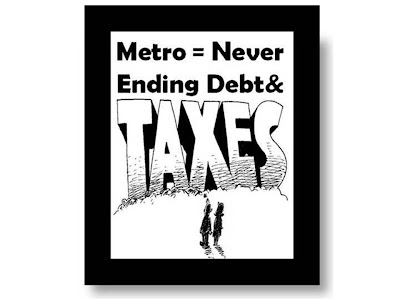 |
| Loudoun Metro Tax Advisory Committee |
Dulles Corridor Metrorail Project
Summary of Proposed Loudoun Taxes and Alternative
Scenarios
Commercial & Industrial (C&I) Tax
Board-presented options: $0.10- $0.17 (8%-13.7% increase over $1.235
base rate)
Note: statutory limit of $0.125 until June 30, 2013, then increases to
$0.25
Loudoun County Chamber of Commerce Resolution: $0.10/$100 (8% increase
over $1.235 base rate)
Problems with this proposed
tax:
-Most
of the western 2/3 of Loudoun is zoned AR1 or AR2, which has been declared by the
Zoning Administrator and County Attorney to be commercial. The county is only
allowed to exempt up to 15% of potentially impacted properties, so AR1 and AR2
will be hit by the C&I tax if this option is chosen by BOS.
-This
funding proposition amounts to asking all businesses countywide to
finance a shift of business development to rail station areas.
-A county-wide C&I property
tax will be passed on to consumers, increasing the costs of all goods and
services purchased in Loudoun County, and driving
business out of Loudoun County.
-You may
be told these taxes will go away eventually. The promise was made that the
Dulles Toll Road tolls would go away. Instead DTR tolls will be soaring to new
highs, as these taxes will in the future.
1-Mile Rail Service District
Board-presented options: $0.09- $0.20 (7.2%-16% increase over $1.235
base rate)
Loudoun County Chamber of Commerce Resolution: $0.20/$100 (16% increase
over $1.235 base rate)
Problems with this proposed
tax:
-The 1-mile tax district will
cause businesses to consider locating just outside the line, reducing the
projected revenues from the tax district, while undermining the intent of
transit-oriented development to consolidate in high-density cores. Loudoun has
not studied this; tax districts were not factored into RCLCO’s Dulles Rail
Fiscal Impact analysis.
-You may
be told these taxes will go away eventually. The promise was made that the
Dulles Toll Road tolls would go away. Instead DTR tolls will be soaring to new
highs, as these taxes will in the future.
-Creation of a tax district would likely
require approval by the Virginia General Assembly, meaning any districts could
not go into effect for some time, probably mid-2013 at the earliest, if ever. (waiting for official verification)
Conclusion
-Loudoun’s Supervisors were...









 What happened a few weeks ago in the quiet town of Lovettsville at the Fire Station? It was a meeting and a conversation about the massive cost of bringing Metro to Loudoun.
What happened a few weeks ago in the quiet town of Lovettsville at the Fire Station? It was a meeting and a conversation about the massive cost of bringing Metro to Loudoun.